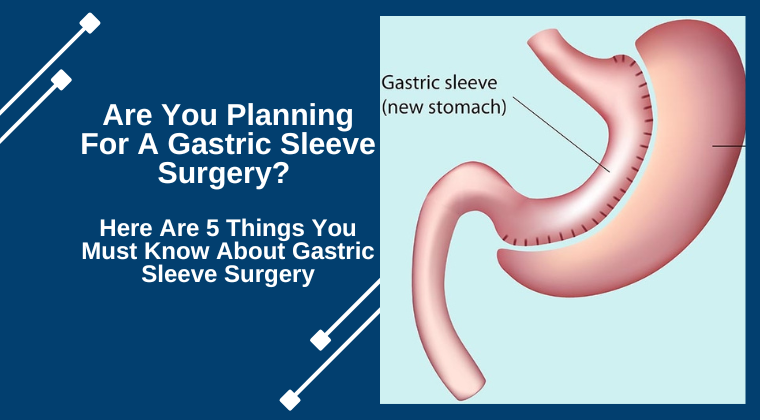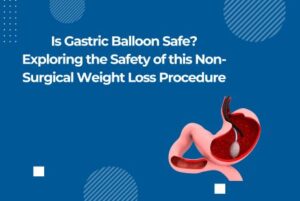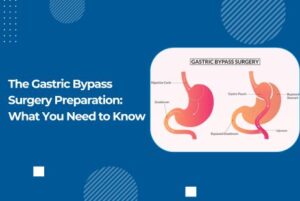
Are you planning for a gastric sleeve surgery? here are 5 things you must know about gastric sleeve surgery
No matter how hard you try to lose weight, sometimes weight loss by natural means (excersise+diet) is very disappointing. That’s when laparoscopic gastric sleeve surgery comes to the rescue.
What is laparoscopic gastric sleeve surgery?
Gastric sleeve surgery, or gastrectomy, is a bariatric surgery that removes a large portion of your stomach, leaving behind a narrow stomach “sleeve.” Gastric sleeve surgery aims to reduce your stomach size and restrict appetite, which eventually reduces calorie intake and helps in weight loss.
Since the procedure is done via laparoscopy, a thin, slender tube with a telescopic camera, it is also called laparoscopic gastric sleeve surgery. You will need to modulate your diet after seeking gastric sleeve surgery, and similarly, you must also know a few other things before opting the gastric sleeve surgery.
It is a permanent surgery and leads to lifetime changes
Unlike other bariatric surgeries, laparoscopic sleeve gastrectomy is permanent stomach resection with irreversible changes. It requires a patient’s lifetime commitment to adopt a positive diet and lifestyle changes to maintain permanent weight loss.
Though adjusting to a new bariatric diet will be a bit discomforting for the first few weeks, you will become accustomed to it with regular practice and a positive mindset. It is recommended to control your meal portions and take wholesome nutrition in small bowls.
Lesser hungry: fuller with small meals
A large portion of the stomach will be permanently removed through laparoscopic sleeve gastrectomy, and the surface area of the stomach to store and digest food will decrease. Hence you will feel less hungry and satisfied with small meal portions.
Also, the gradual habit formation for adopting a new bariatric diet will produce hormones that make patients feel less hungry than usual.
Diet restriction via laparoscopic sleeve gastronomy can offer up to 80% weight loss
Research has proven that laparoscopic sleeve gastrectomy leads to 60-80% weight loss within 2 years of procedure. The science behind it is calorie intake restriction with the procedure. The person has lesser cravings and therefore eats less, which causes huge weight loss.
The doctor will recommend nutrition supplements to cover your vitamin deficiency due to a restricted diet.
Laparoscopic gastric sleeve surgery is very safe
Laparoscopic sleeve gastrectomy requires lesser recovery time than traditional sleeve surgery. Traditional sleeve surgery is open surgery with wider and multiple incisions, causing a greater risk of postoperative side effects like bleeding, pain, infection, and late recovery.
On the contrary, laparoscopic gastric sleeve surgery is minimally invasive, causing minimal scars and post-operative complications. Each gastric sleeve gastrectomy surgery is customized and designed according to patients’ risk factors and health conditions. To further simplify the process, the patients are divided into two risk categories- high risk (with BMI between 50-60) and normal to moderate risk (with BMI lesser than 50).
No external objects are inserted into the stomach
Another reason why it is a safe surgery is—no foreign objects are inserted into the stomach. Unlike lap band or gastric balloon surgery, no gastric band or gastric balloon is inserted inside the stomach.
Hence it reduces the risk of organ damage due to lap band slipping or stomach lining irritation (which may be a case for gastric balloon).
Patients considering laparoscopic sleeve gastrectomy in Dubai must know about these facts. To clear more doubts or to have laparoscopic gastric sleeve surgery, you can consult Dr. Girish Juneja, the most revered laparoscopic and bariatric surgeon in Dubai and the head of Weight Loss Dubai. He will evaluate your condition and guide you through the process of gastric surgery compassionately and professionally.

Dr. Girish Juneja

Dr. Girish Juneja
Related Posts

Is Gastric Balloon Safe? Exploring the Safety of this Non-Surgical Weight Loss Procedure
Read More »
No matter how hard you try to lose weight, sometimes weight loss by natural means (excersise+diet) is very disappointing. That’s when laparoscopic gastric sleeve surgery comes to the rescue.
What is laparoscopic gastric sleeve surgery?
Gastric sleeve surgery, or gastrectomy, is a bariatric surgery that removes a large portion of your stomach, leaving behind a narrow stomach “sleeve.” Gastric sleeve surgery aims to reduce your stomach size and restrict appetite, which eventually reduces calorie intake and helps in weight loss.
Since the procedure is done via laparoscopy, a thin, slender tube with a telescopic camera, it is also called laparoscopic gastric sleeve surgery. You will need to modulate your diet after seeking gastric sleeve surgery, and similarly, you must also know a few other things before opting the gastric sleeve surgery.
It is a permanent surgery and leads to lifetime changes
Unlike other bariatric surgeries, laparoscopic sleeve gastrectomy is permanent stomach resection with irreversible changes. It requires a patient’s lifetime commitment to adopt a positive diet and lifestyle changes to maintain permanent weight loss.
Though adjusting to a new bariatric diet will be a bit discomforting for the first few weeks, you will become accustomed to it with regular practice and a positive mindset. It is recommended to control your meal portions and take wholesome nutrition in small bowls.
Lesser hungry: fuller with small meals
A large portion of the stomach will be permanently removed through laparoscopic sleeve gastrectomy, and the surface area of the stomach to store and digest food will decrease. Hence you will feel less hungry and satisfied with small meal portions.
Also, the gradual habit formation for adopting a new bariatric diet will produce hormones that make patients feel less hungry than usual.
Diet restriction via laparoscopic sleeve gastronomy can offer up to 80% weight loss
Research has proven that laparoscopic sleeve gastrectomy leads to 60-80% weight loss within 2 years of procedure. The science behind it is calorie intake restriction with the procedure. The person has lesser cravings and therefore eats less, which causes huge weight loss.
The doctor will recommend nutrition supplements to cover your vitamin deficiency due to a restricted diet.
Laparoscopic gastric sleeve surgery is very safe
Laparoscopic sleeve gastrectomy requires lesser recovery time than traditional sleeve surgery. Traditional sleeve surgery is open surgery with wider and multiple incisions, causing a greater risk of postoperative side effects like bleeding, pain, infection, and late recovery.
On the contrary, laparoscopic gastric sleeve surgery is minimally invasive, causing minimal scars and post-operative complications. Each gastric sleeve gastrectomy surgery is customized and designed according to patients’ risk factors and health conditions. To further simplify the process, the patients are divided into two risk categories- high risk (with BMI between 50-60) and normal to moderate risk (with BMI lesser than 50).
No external objects are inserted into the stomach
Another reason why it is a safe surgery is—no foreign objects are inserted into the stomach. Unlike lap band or gastric balloon surgery, no gastric band or gastric balloon is inserted inside the stomach.
Hence it reduces the risk of organ damage due to lap band slipping or stomach lining irritation (which may be a case for gastric balloon).
Patients considering laparoscopic sleeve gastrectomy in Dubai must know about these facts. To clear more doubts or to have laparoscopic gastric sleeve surgery, you can consult Dr. Girish Juneja, the most revered laparoscopic and bariatric surgeon in Dubai and the head of Weight Loss Dubai. He will evaluate your condition and guide you through the process of gastric surgery compassionately and professionally.






